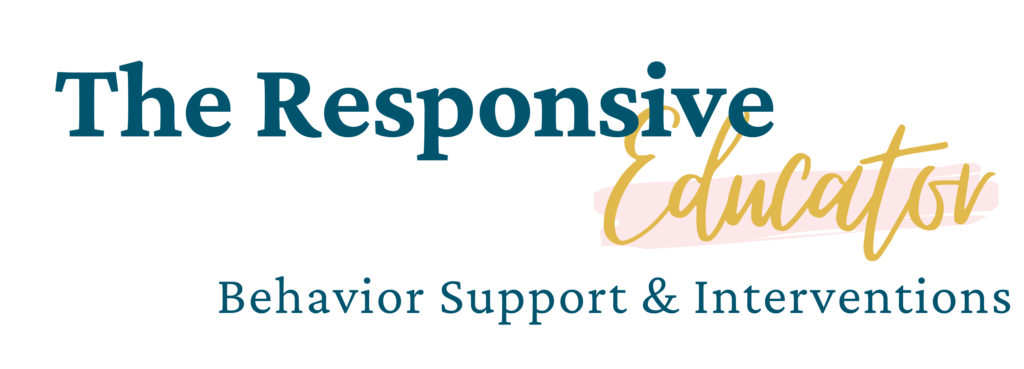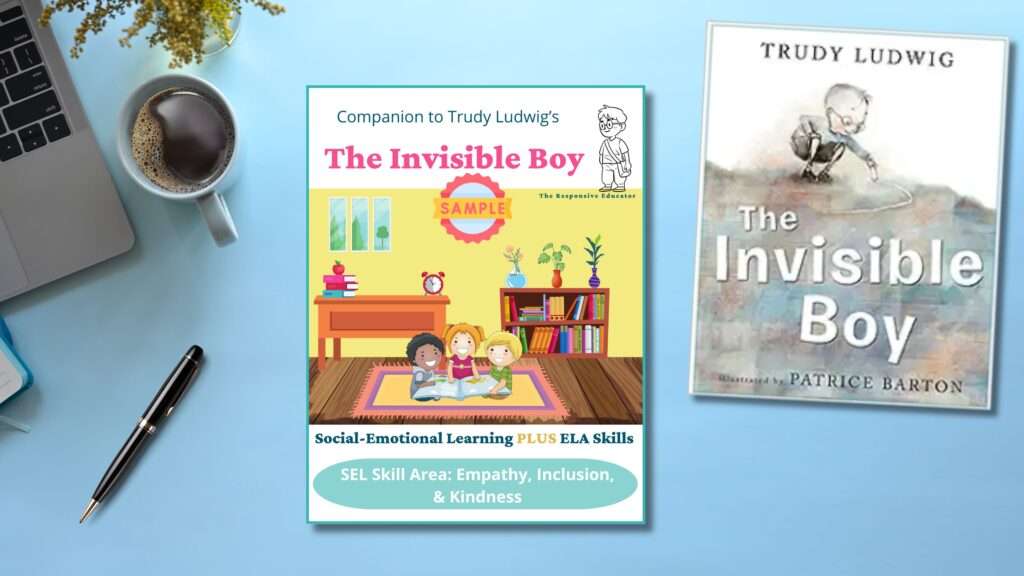


Helping children navigate big emotions and challenging situations is a critical part of their development, and these self-control books offer valuable tools for kids of all ages. From teaching toddlers how to calm themselves down to helping school-aged children understand frustration, jealousy, and the impact of their moods on others, these books tackle a wide variety of issues.
Whether it’s learning to pause and breathe during a tantrum, practicing kindness to break a cycle of negativity, or discovering how to handle difficult feelings like envy or anger, these stories provide relatable scenarios and practical strategies. With engaging narratives, relatable characters, and valuable life lessons, these self-control books empower children to build emotional regulation, strengthen relationships, and approach challenges with resilience and empathy.
For some of the books on this site, I’ve created interactive read-alouds designed to enrich their use in the classroom. These resources include discussion questions, activities, and prompts that actively engage students and deepen their understanding of key themes. More interactive read-alouds are on the way! If there’s a specific book you’d like to see included, please reach out using the contact form at the bottom of the page.
For more insights on supporting social-emotional learning (SEL) and incorporating interactive read-alouds into your teaching, explore these posts:
(As an Amazon affiliate, I earn a small commission if you purchase products through the links on my posts. Thank you for your support!)
Summary: Calm-Down Time provides toddlers and their caregivers with simple strategies to manage strong emotions and meltdowns. Using rhythmic text and warm illustrations, the book introduces calming techniques such as finding a quiet place, breathing exercises, asking for hugs, and other self-soothing behaviors. Children are encouraged to express their feelings in a healthy way, with the mantra, “One, two, three… I’m calm as can be. I’m taking care of me.” This engaging book helps children regain control during difficult moments, fostering emotional regulation in even the youngest readers.
Description: This book is designed specifically for toddlers and preschoolers, offering age-appropriate tools for managing big feelings. Verdick presents these concepts in a way that is easy for young children to understand, using repetition and soothing language. The vibrant illustrations complement the text, visually guiding children through the process of calming down. Additionally, the book includes helpful tips for parents and caregivers, offering practical advice on how to approach tantrums and foster mindfulness at an early age.
Reviews and Considerations: Parents and educators praise Calm-Down Time for its effectiveness in teaching young children self-regulation strategies. Many note its usefulness during emotional outbursts, with some children even requesting the book during or after a tantrum. Readers appreciate the actionable techniques and the positive impact they’ve seen on their child’s emotional management. Some reviewers mention that while the book’s calm tone and strategies resonate with children as young as 18 months, older toddlers and preschoolers (ages 2-4) tend to engage most with its content. Though a few note that it may not instantly prevent meltdowns, its repetitive use helps build the foundation for long-term emotional regulation.

Summary: Ella McKeen is the reigning champion of kickball at her school—until the new girl, Riya, shows up and matches her skill. When Ella loses her title, her frustration boils over, leading to a dramatic tantrum in front of her classmates. Through relatable emotions and a moment of self-reflection, Ella learns an important lesson about managing her feelings and the value of sportsmanship. This engaging picture book captures the highs and lows of childhood competition and the journey toward self-control and kindness.
Description: This debut picture book by Beth Mills tackles the challenges of handling competition, jealousy, and big emotions with a relatable and humorous approach. Vibrant illustrations bring Ella’s dramatic meltdown and ultimate growth to life, making it a fun and impactful read. While perfect for encouraging discussions about sportsmanship, it also resonates with broader themes of emotional regulation and friendship. The realistic portrayal of emotions makes it an excellent resource for children navigating their own struggles with frustration and self-expression.
Reviews and Considerations: Readers applaud Ella McKeen, Kickball Queen for its lively illustrations and impactful message about controlling emotions and being a good sport. Parents, educators, and children alike find the story both entertaining and insightful, with many noting its effectiveness in sparking meaningful conversations about handling competition. The book’s humor and relatable scenarios make it an enjoyable read-aloud, especially for young readers dealing with similar challenges. While the focus is on sportsmanship, the overarching lessons about emotional regulation and self-reflection make this a valuable addition to any child’s library.

Summary: In this empowering book, children follow Sebastien as he encounters everyday challenges and learns how to navigate them using simple strategies and positive self-talk. Whether dealing with frustration, sadness, or anger, Sebastien models constructive responses that help him say, “I can handle it!” This book encourages children to build emotional resilience and develop their problem-solving skills through relatable scenarios and a repeated, uplifting mantra.
Description: Laurie Wright’s I Can Handle It! provides children with practical tools for managing emotions and solving problems independently. The engaging and humorous scenarios show young readers how to approach various emotions and situations with confidence, from dealing with frustration when adults don’t listen to managing bedtime struggles. The light-hearted tone and illustrations keep the content accessible for children, while the consistent message of empowerment through self-talk helps build emotional strength. The book also serves as a valuable resource for parents and educators, offering a springboard for conversations about handling emotions constructively.
Reviews and Considerations: Readers praise I Can Handle It! for its relatable content, humorous approach, and positive impact on children’s emotional regulation. Parents and educators often highlight the effectiveness of the “I can handle it” mantra, which children adopt into their own vocabulary. While some reviewers find certain suggestions in the book a bit exaggerated, they appreciate the opportunities these moments provide for further discussion. The book is especially recommended for children ages 4-8, though its lessons resonate with a broader age range. Despite minor critiques about specific examples, the overall response is overwhelmingly positive, with many calling it a must-have for fostering resilience and self-confidence in children.

Summary: Millie is quiet, sweet, and often overlooked. Her classmates ignore her, step on her chalk drawings, and never apologize. Tired of being invisible, Millie decides to be “fierce,” acting out to gain attention. But her newfound wild behavior only pushes others away. Realizing that being fierce isn’t the solution, Millie learns to balance her kindness with inner strength, keeping her fierce side as a tool when needed.
Description: Jane Manning’s Millie Fierce is a vibrant and relatable story about a young girl who struggles with being overlooked and explores how to express herself constructively. The book uses bold illustrations and engaging storytelling to show how attention-seeking behaviors, such as acting out, can backfire and highlights the importance of kindness paired with confidence. This thought-provoking tale provides a platform for discussing self-expression, emotions, and the impact of our actions on others.
Reviews and Considerations: Readers praise Millie Fierce for its relatable narrative and its ability to open discussions about emotions and behaviors. Many appreciate how the story gently explores why children might act out and the consequences of such actions. The book’s illustrations are celebrated for vividly capturing Millie’s transformation and emotions. While some feel the story touches on tough emotions without fully resolving them, most agree it’s an excellent tool for helping children understand the importance of kindness and self-awareness. Teachers and parents find it useful for teaching emotional regulation and empathy.

Summary: In this engaging addition to the “My Dragon Books” series, a young boy and his dragon, Diggory Doo, navigate the challenges of jealousy and envy. Whether it’s feeling envious of a friend’s new toy, sad about being left out, or jealous of a sibling, Diggory learns to recognize and manage these emotions. With gentle guidance, he discovers the value of appreciating what he has and finding joy in others’ happiness. This relatable story provides practical strategies for children to handle their own feelings of jealousy and envy in a constructive way.
Description: Steve Herman’s Help Your Dragon Deal with Jealousy and Envy provides an engaging way to teach children about self-control and emotional regulation. Through relatable scenarios and vivid illustrations, this story helps young readers understand and manage feelings of jealousy and envy. The whimsical dragon character demonstrates practical strategies for handling emotions with self-awareness, encouraging kids to develop empathy and make thoughtful choices.
Reviews and Considerations: The Dragon series is celebrated for teaching essential life skills, and this book is no exception. Parents and educators appreciate how it simplifies self-control strategies and helps children articulate their feelings. The relatable examples, actionable solutions, and charming illustrations make it a valuable resource for addressing sibling rivalry and peer conflicts. This book is a favorite for fostering self-discipline and emotional growth in young readers.

Summary: In Teach Your Dragon Respect by Steve Herman, readers meet a mischievous dragon who struggles with disrespectful behavior, such as interrupting friends, disregarding rules, and being loud in quiet places. Through guidance and support, the dragon learns what it means to show respect to people, places, and things. The story illustrates how practicing respect not only strengthens relationships but also requires self-control and thoughtfulness. Young readers will enjoy the dragon’s journey as he transforms his behavior and begins to understand how his actions affect others.
Description: This engaging book is part of the beloved Dragon series and is a wonderful resource for teaching children respect and its connection to emotional awareness and behavior. Through relatable scenarios and colorful illustrations, children learn the value of being respectful to parents, teachers, friends, and even public spaces. By modeling self-control and kindness, the dragon sets an example of how to interact positively with the world around us, making this book a valuable addition to any family or classroom library.
Reviews and Considerations: Parents, teachers, and children alike love the Dragon series for its ability to address important life skills in an entertaining and accessible way. Readers appreciate how this book tackles respect from multiple angles—toward people, rules, and environments—while weaving in the importance of self-control in managing behavior. The bright illustrations and relatable story keep children engaged, while adults value the book’s ability to spark meaningful conversations about social-emotional skills. This installment is a favorite for teaching respect and fostering empathy.

Summary: In The Very Frustrated Monster by Andi Green, readers are introduced to Twitch, the Monster of Frustration, who constantly faces challenges that leave him saying, “Why me?” and “It’s not fair!” From chaotic mornings to mishaps with friends, Twitch’s journey highlights the frustrations that many children experience. Along the way, Twitch meets a calm squirrel who inspires him to see frustration from a new perspective. Through this story, readers learn that frustration is a normal emotion and discover ways to navigate it with patience and self-control.
Description: This engaging addition to the WorryWoo Monsters series is a charming exploration of how to handle life’s little setbacks. With vibrant illustrations and a relatable main character, The Very Frustrated Monster helps children understand the importance of managing frustration while introducing self-control and positive thinking as tools to face challenges. The story encourages resilience and emotional growth, making it a fantastic resource for teaching emotional regulation to children.
Reviews and Considerations: Readers and educators appreciate this book for its ability to address frustration in a relatable and visually captivating way. While some felt the resolution could include more specific strategies, most praised the book for helping children identify and discuss their emotions. Parents and counselors find the character of Twitch engaging and relatable, making it a helpful tool for conversations about emotional regulation and self-control. The WorryWoo Monsters series continues to be celebrated for its ability to simplify complex emotions while maintaining charm and humor.



Summary: The Very Grumpy Day by Stella J. Jones is a heartwarming picture book about how moods can ripple through a community and how kindness can reverse the effects of negativity. The story begins with Bear, whose bad mood spreads to his friends in the forest—Mole, Hedgehog, and Fox. Each character, affected by Bear’s grumpiness, passes it along until Mouse intervenes with a simple act of kindness. This small gesture sparks a chain reaction of positivity, reminding readers of the power of thoughtfulness and empathy.
Description: This charming story, paired with Alison Edgson’s delightful illustrations, captures the impact of emotions on others and the importance of self-awareness and self-control. As Bear’s bad mood spreads, readers see how frustration and negativity can influence relationships, but also how kindness and patience can heal and uplift. With its playful yet meaningful message, The Very Grumpy Day is a great tool for teaching children about emotional regulation, empathy, and the importance of breaking cycles of negativity with positive actions.
Reviews and Considerations: Readers praise The Very Grumpy Day for its relatable theme and engaging storytelling. Parents and educators appreciate the valuable lesson on how one’s mood can affect others, delivered in a way that is easy for young children to understand. The book has been described as a favorite bedtime read, with its humorous yet meaningful narrative keeping kids entertained while sparking conversations about managing emotions. The bold text and interactive sound effects like “SQUASH” and “SPLOSH” invite participation, making it a hit with younger readers. Overall, this book is celebrated as an effective and enjoyable way to introduce children to emotional intelligence and the power of small acts of kindness.

Sign up now to receive a free sample of “The Invisible Boy” Interactive Read-Aloud Lesson Plan! This comprehensive resource includes engaging activities designed to help your students develop empathy and inclusion.
By signing up, you will also join our newsletter, where you’ll receive:
Join our community of educators dedicated to fostering social-emotional growth in the classroom!

( ) = Coming Soon
Body Safety & Personal Boundaries
(Bravery & Trying New Things)
(Conflict Resolution)
(Compromise / Cooperating)
Feelings & Emotional Awareness
(Kindness & Generosity)
(Mindfulness)
(Peer Influence)
(Perseverance)
(Positive Attitude)
(Sensory Processing)
(Separation Anxiety)
(Sharing)
(Speaking Politely)
(Teasing & Bullying)
(Trauma Recovery)
(Winning & Losing)